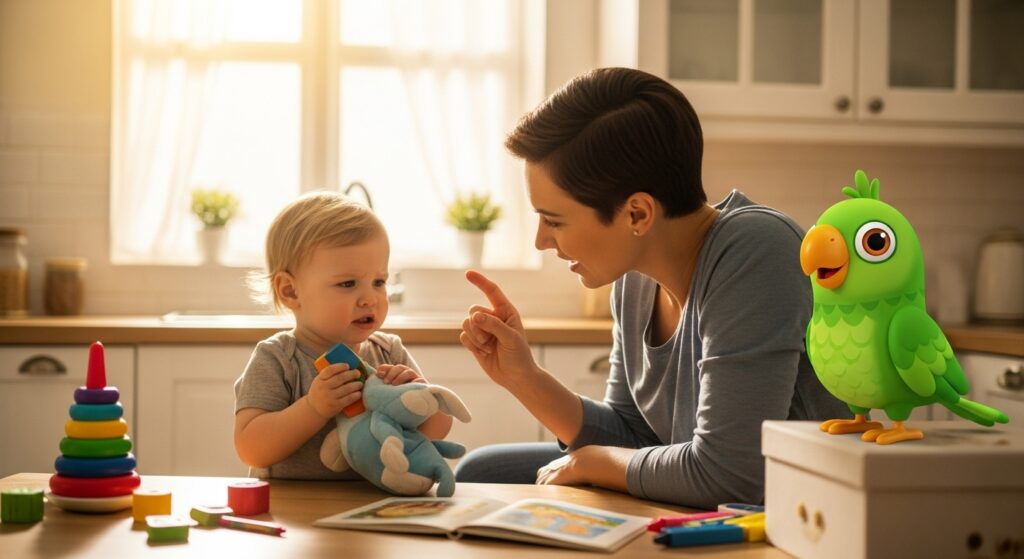Pretend play is often seen as a delightful activity where toddlers transform into superheroes, chefs, or even parents themselves. However, these imaginative adventures are more than just fun and games. They are crucial for developing communication skills in young children. Through pretend play, toddlers learn to express themselves, understand others, and navigate the world of language.
The Role of Imaginative Play in Language Development
Building Vocabulary
When children engage in pretend play, they naturally expand their vocabulary. By taking on different roles, toddlers encounter new words and phrases. For instance, a child pretending to be a doctor might learn terms like “stethoscope” or “appointment.” These play scenarios provide a practical context for toddlers to learn and use new words, aiding in vocabulary growth that goes beyond everyday language.
Practicing Sentence Structure
Pretend play encourages toddlers to form sentences as they narrate their actions and engage with others. While playing house, for example, a child may say, “I am cooking dinner,” or “Can you help me clean?” These experiences allow them to construct sentences, practice grammar, and improve their language skills in a natural and engaging way.
Enhancing Social Communication Skills
Understanding Turn-Taking
One of the foundational aspects of communication is the ability to take turns in conversation. During pretend play, children learn to listen and wait for their turn to speak. This practice is essential for effective communication and helps toddlers understand the flow of dialogue in social interactions.
Reading Non-Verbal Cues
Pretend play often involves interpreting facial expressions, gestures, and tone of voice. Children learn to read these non-verbal cues as they interact with peers or adults in their imaginative worlds. This skill is crucial for understanding emotions and responding appropriately, fostering empathy and emotional intelligence.
Encouraging Creativity and Problem-Solving
Creative Expression
Imaginative play offers a safe space for toddlers to express their thoughts and feelings. As they enact various scenarios, they explore different ways of expressing emotions and ideas. This creative expression is a vital component of communication, allowing children to convey complex concepts in innovative ways.
Solving Problems Through Role Play
When toddlers encounter challenges during pretend play, such as a missing tea cup in a tea party, they learn to communicate solutions. These problem-solving opportunities enhance their ability to articulate thoughts and collaborate with others, strengthening their overall communication skills.
Parent Involvement in Pretend Play
Setting the Stage
Parents can facilitate pretend play by providing props and creating environments that inspire creativity. Simple items like costumes, kitchen sets, or building blocks can spark a child’s imagination. By offering diverse materials, parents can help expand the scope of pretend play, introducing new vocabulary and scenarios.
Joining the Adventure
Actively participating in your child’s pretend play can significantly enhance their communication skills. When parents join in, they model language use, introduce new vocabulary, and guide children in structuring sentences. Moreover, this shared activity strengthens the parent-child bond and provides opportunities for teaching social skills in a fun and engaging way.
Fostering Peer Interactions
Playdates and Group Play
Organizing playdates or group play sessions encourages toddlers to practice communication with their peers. These interactions teach children to negotiate roles, resolve conflicts, and collaborate on shared goals, all of which are crucial for effective communication. Through these experiences, toddlers learn to adapt their language and behavior to different social contexts.
Observational Learning
During group play, children often learn by observing others. They pick up new words, phrases, and communication strategies by watching their peers. This observational learning complements active participation and enriches their communication repertoire.
Conclusion
Pretend play is a powerful tool in a toddler’s language development journey. By embracing their imagination, children not only have fun but also build essential communication skills. Through imaginative scenarios, toddlers expand their vocabulary, practice sentence structure, and enhance their social skills. Parents play a crucial role in this process by setting the stage and engaging in play alongside their children. These efforts lay the foundation for effective communication, preparing toddlers to navigate the world with confidence and creativity. As a parent, you can feel reassured knowing that every moment of pretend play is a step towards a brighter, more communicative future for your child.

